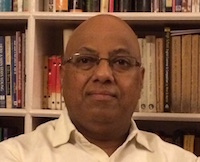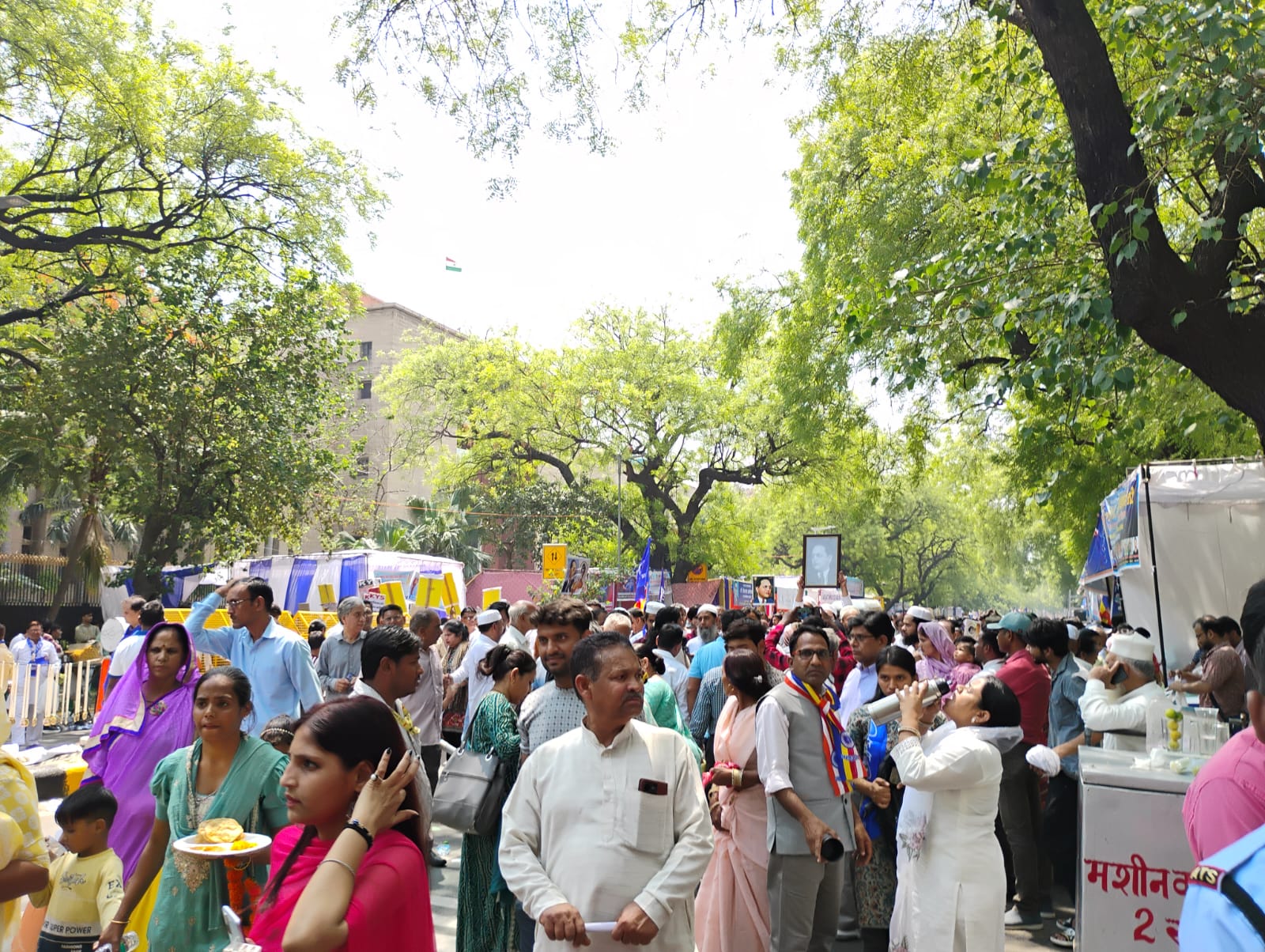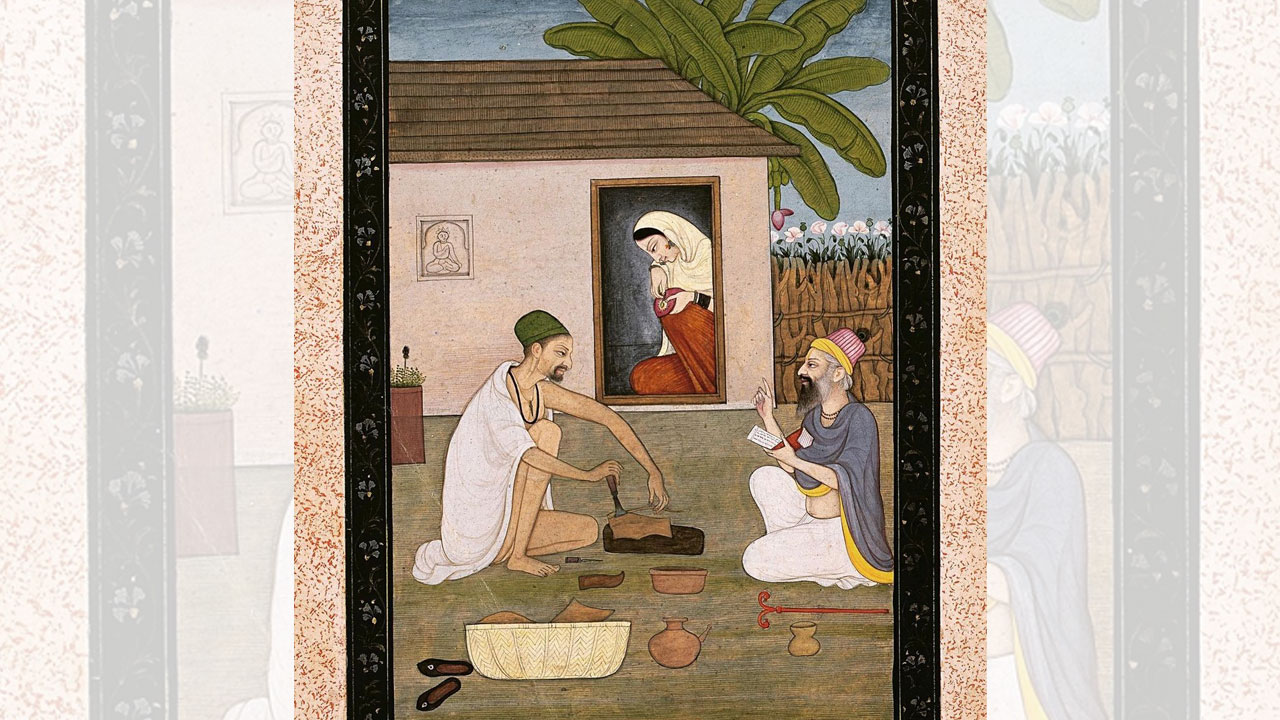
There is nothing that I have urged in support of my thesis which I have asked my readers to accept on trust. I have at least shown that there exists a preponderance of probability in favor of what I have asserted. It would be nothing but pedantry to say that a preponderance of probability is not a sufficient basis for a valid decision … I am not so vain as to claim any finality for my thesis … my critics [should] consider whether this thesis is not a workable and therefore, for the time being, a valid hypothesis if the test of a valid hypothesis is that it should fit in with all surrounding facts, explain them and give them a meaning which in its absence they do not appear to have. I do not want anything more from my critics than a fair and unbiased appraisal. [Emphasis Added]
– R. Ambedkar, Preface to The Untouchables, 1948
This article is a commentary on Ambedkar’s historical method from the perspective of a professional historian educated, trained and employed in India. It presumes that the establishment of Indian historians has not, so far, acknowledged his historical approach to politics as a legacy of his prodigious intellect. I don’t remember my respected Marxist professors referring to him as a historian during my student days at the Centre for Historical Studies, JNU – the premier establishment for historical research in India – in the 1980s. Nor do I remember his name being taken alongside Jawaharlal Nehru’s as a historian of India either in college or in any Indian university. Even in the Department of History, Delhi University, where I have taught history to post-graduate and research students since 2009, Ambedkar is usually not recognized as a historian despite the deep historicity of his overall work on the Indian caste system.
This state of affairs has come to pass because of the following causes. First, questions of caste and untouchability, in general, have not been accorded the importance they deserve in Indian historiography despite the rise of the Subaltern Studies in the 1980s and 1990s. Generally, in Indian social sciences, sociologists or anthropologists deal with matters of caste. Two, most Indian history departments teach historical methodology in a Eurocentric context. The “models” of history writing included in their methodology and theory curriculum are usually Western: Whig, Utilitarian, Marxist, Prussian, Annales, Structuralist, Post-Structuralist, Postmodern, etc. This in itself is not unproductive but leaves little scope to teach historical methods arising from modern Indian thinkers like Phule, Periyar and Ambedkar. For instance, whenever Indian history departments raise the importance of hermeneutics they may refer to R.G. Collingwood or William Dilthey or Martin Heidegger but never a tradition of modern hermeneutics going back to at least Jotiba Phule in the 19th century.

This article seeks a redress of this imbalance by drawing attention to the immense hermeneutic potential of Ambedkar’s writings on caste and other political and economic matters. It proceeds on the assumption that in engaging with the theory and structure of caste and the problem of untouchability in India, Ambedkar had pioneered a constructive method of deconstruction long before the relativism and subjectivism of postmodernism and deconstruction developed by anti-Marxist philosophers like Michel Foucault and Jacques Derrida confounded the practice of history writing post 1945. By the 1980s, an influential section of Indian social scientists, including historians, were affected by the linguistic, cultural and feminist turns. In such conditions, the question of seriously taking Ambedkar as a historian did not arise. In the 1950s, 1960s and 1970s he was not paid enough attention because nationalists and Marxists held sway over Indian historiography. To the nationalist the Nation, and to the Marxists Class remained central; both tended to underestimate the role of caste in Indian history and the specific problems of the Antyaja Jatis.
Nationalist and Marxist history overlook caste
To understand Ambedkar as a historian, a visit to the intellectual climate of late colonial India is necessary. This period of Indian history was dominated by the rise of nationalisms that either militated against colonialism or each other. Since these ideologies were socially aggregative in character and objective, they usually undermined the divisiveness and oppression caused in Indian society by caste. The writing of history followed this political trend. Further, it was unusual for Indian historians to debate questions of historical methods in the 1940s; the official archive and colonial historical methods reigned supreme over their imagination and the difference between the Imperialist and Nationalist historians was one of objectives and not methods. Most Indian historians were content with the canons of historiography taught to them by their British professors who, in turn, were mostly Whig in orientation. The Indian nationalist historians of all hues wrote history with the help of these canons, which had influenced their minds to favour Western historiography. Perhaps, some exceptions to this rule were the Marxists, like D. D. Kosambi, who applied Marxism and field work to the study of Indian history in the first few decades of the 20th century. Notwithstanding the remarkable advance in historical insights achieved by the Indian Marxists, much of their work concentrated on the working class as a class to the detriment of caste-based studies.
Indian historiography in the 1940s rarely dealt with the questions of caste, tribe and gender, which were generally left to the sociologists many of whom were interested in divesting these topics of politics altogether. The model of Sanskritization emanated from Indian sociology and underestimated the contradictory nature of caste relations in the Indian everyday life. B. R. Ambedkar’s innovative views on the conception of, and writing, history appear nothing less than astonishing in this context. At a time when the “salt and pepper” professional Indian historians like Sir Jadunath Sarkar rarely ventured beyond the narratives of historical individuals and events in their writings, Ambedkar reflected on those aspects of historiography that exercise our minds today. He conceived history as a synthesis of art, science and storytelling underscored by the historian’s fertile and creative imagination as early as 1948 when history departments in the Indian universities rarely taught historiography as a subject unto itself; history innocently existed in the official archive for them to be discovered and narrated as professionally as possible. In this context, his suggestion that the historian must be self-conscious in the task of raising scientific consciousness among his readers rings true for all time. The fact that only by a conscious critical engagement with the historian’s sources, which in Ambedkar’s case comprised the texts produced by Brahmans and Buddhists in Ancient India, could social history as a subject be conceived, underlines his entire corpus of writing. Since the historian always makes an argument his view of the sources can never be informed by simple positivism, which drives history towards individuals and events to the detriment of the interpretative contexts within which they are always located.
A tug of war for Ambedkar
Dr B. R. Ambedkar’s legacy thrives in an intriguing intellectual and political milieu. His differences with the Congress, on questions of caste and the Congress leaders’ attitudes towards the Dalits, and other matters like the Hindu Code Bill, have not deterred the Congress leaders from manufacturing and appropriating a false image of him. Since its rout in the 2014 General Elections the Congress is hard pressed to regain its image as India’s premier centrist-liberal party. Therefore, it is desperate to claim Ambedkar primarily as a constitutional expert. It is true that Ambedkar collaborated with Nehru in laying down the foundations of post-colonial India but this collaboration between two modernists should not make us gloss over the fundamental differences between Ambedkar’s politics and the Gandhian morality that guided the Congress at least till 1947. On the other hand, the Hindutva forces that rule India today are trying to appropriate Ambedkar to their cause. In 1997, right-wing journalist Arun Shourie had called Ambedkar a pro-British false god unworthy of worship. Now that position is passé. These days, the BJP-RSS wants to convert the millions of Dalit and Shudra followers of Babasaheb to its mission of creating a Hindu Rashtra. At the same time, the Indian state and the educational institutions, under Hindutva influence, continue the policy of persecuting and ostracizing Dalit students and activists. The newfound BJP’s love for Ambedkar demonstrates nothing but the politics of symbolism best summarized in the Hindi adage ‘Muhmein Ram, bagalmeinchuri’. The Hindutva ideologues know that India cannot be turned into a Hindu Rashtra by only alienating and demonizing the Muslims. The BJP’s 2015 defeat in Bihar, preceded as it was by the tactless pronouncements of the arrogant RSS chief on reservations, forced it to reconsider its hostility to Ambedkar. However, the impressive electoral success of the BJP in Uttar Pradesh in 2017 and the appointment of a “Yogi” as the state’s chief minister has infused more energy in the anti-Dalit Hindutva forces in the state. Despite these developments, the symbolic RSS appropriation of Ambedkar proceeds in line with the objectives of the Hindu Rashtra. However, these selective misleading appropriations of Ambedkar do not square with his critical reading of Indian history; Babasaheb nether squares with the RSS nor the Congress.

These attempted appropriations of Ambedkar necessitate periodic visits to his multifarious and prodigious intellect. So far he has been examined and accepted as an expert on the Indian caste system, the politics of constitutionalism and an organic intellectual of the Indian untouchable and lower castes. There is no doubt that these are germane aspects of his overall thought but I would argue that the sum total of his razor sharp intellect exceeds these achievements and rises to a level of philosophical reasoning rarely achieved by learned Indians in colonial and even post-colonial India. His belief in the universal Enlightenment values made him a modernist and a lifelong adversary of Sanatan Hinduism – there was no room for a flirtation with romanticism, superstition or mysticism in his historical vision. He was of the belief that God did not create society and its various grotesque features like caste and untouchability. His critical understanding of Indian history also negated the sentimentality that Gandhi demonstrated for the Hindu Varnashramdharma and the idyllic pre-modern village – clearly a myth suited to Savarna hegemony and the notion of Ramrajya. All this makes the appropriation of Ambedkar by the Congress from a liberal-Hindu viewpoint impossible; Ambedkar viewed Indian society and the Indian village from the viewpoint of the oppressed castes. Unlike Gandhi and other Congress leaders, he did not favour caste reconciliation but desired the complete abolition of caste. Gandhi, for instance, favoured a reform of the caste system but not its abolition. In contrast, Ambedkar’s objective was the abolition of the caste system. Gandhi was a reformer from above, Ambedkar a revolutionary from below. The historical explanation of India offered by both men differed in accordance with their political objectives.
This brief intervention in the omnipresent vexed dialogue which post-colonial Indian modernity has with Ambedkar asserts that his profound engagement with the universal and scientific values of the Enlightenment, with a mix of dialectics, logic and reason at their centre, made him an “anti-myth” historian par excellence much before history moved in the direction of becoming a critical discipline in select Indian universities post 1947[i]. His writings as a historian and essayist, pace Voltaire, Goethe and Gorky, who influenced his thinking, are too critical of the Hindu religion and therefore cannot be appropriated by the descendants of those who he criticized with an academic rigour rare in his day. In his hands the craft of history assumed a unique ambition; the destruction of an unjust order based on caste distinctions. Since his politics were a product of his unsentimental vision of Indian history and vice versa, his historical views and method need a reappraisal in the context of a cow-worshipping, caste valorizing and anti-Dalit Vedic paligenetic nationalism which governs popular historical imagination in the times of globalization[ii]. The Annihilation of Caste and several of his rigorously argued essays places him in the rich tradition of counter-culture omnipresent, but under-taught, in India.
Starting with contemporary political questions
A full examination of Ambedkar’s writings, spread over thousands of pages, from the viewpoint of discovering him as a historian is beyond the scope of this article. Though such an enterprise might prove fruitful in future, at hand I have one text, The Untouchables, the preface of which comprises a succinct comment on the historical method that Ambedkar followed as he set out to deconstruct the scriptural shibboleths of caste and thereby the basis of Hinduism[iii].
The essays in The Untouchables and the method of history outlined in its preface demonstrate at least three crucial attributes of Ambedkar’s historical thought. One, and here we are reminded of the idea of history visualized by R. G. Collingwood, Babasaheb’s historical inquiries began with contemporary political questions directly related to power. This political approach to history places him in the category of scholars like Karl Marx, Antonio Gramsci and Paul Thompson, for whom the study of history, ie the examination of causes, consequences and discourse, was related to the exercise of power and its legitimization by the ruling classes. The tension and resolution of social contradiction is central to this historical approach. The primary political questions, and the dominant view of a subject pertinent to them, exercised Ambedkar’s intellect and he embarked on a vigorous mental journey to answer them.
Two, and in this respect Ambedkar’s method came close to his contemporary, and the founder of the Annales School, Marc Bloch, was his pursuit of a regressive method of historical analysis. His historiography was interdisciplinary. Its objective was to prove or disprove generalizations regarding the present and possible future of Indian society. His salutary research aim was to show how the present was produced by the past – there is no room for studying the past for its own sake or entertainment in his historiography. The mythology of the nation or community is absent from his work. His view of Indian society was structural and caste appears in it as a longue duree factor (long term historical phenomena).[iv] Caste is both the base and superstructure of Indian society; both relations of production and power are mediated through it. His essays confirm his deep understanding of the interaction of the past and the present – the hallmark of a good historian forever alert to the politics of his age.
Three, his essays convey his fertile historical imagination and superb command over language – qualities essential to the practice of any meaningful social science. Here, it should be remembered that while majoring in Economics at Columbia he had read history and sociology as ancillary subjects. This inter-disciplinary training enriched his approach to the problems of inequality in Indian society throughout his career. His insightful essays prove that he applied a lawyer’s skill of cross-examination to the sources of history and tradition to arrive at conclusions with which it is difficult to disagree. Some of these conclusions may appear dated or overstated today but that in no way diminishes the hermeneutic method he used to arrive at them.
Since Ambedkar’s becoming a historian of Indian society was intimately connected with his negation of caste and thereby the Hindu religion, he began the preface by coming to the point straightaway by raising the political question which inspired his historical research. The preface shows that what Marx is to Capitalism, Ambedkar is to Hinduism; to the former, the relations of production produced by capitalism comprised the core of any meaningful analysis of capitalism and to the latter caste was at the heart of the relations of power that sustained Sanatan Hinduism. According to the preface, the “Hindu Civilization” is “a diabolical contrivance to suppress and enslave humanity. Its proper name would be Infamy.”
Furthermore, the Hindus, throughout history, had neither searched for nor rationally investigated the origin of their own civilization, ie the varna-jati system. Hence the first question: Why did the Hindu not scientifically investigate his so-called civilization? Because the Hindu did not consider the existence of the caste system and untouchability a “matter of apology or shame”. He felt “no responsibility either to atone for it or to enquire into its origin and growth”. Reminiscent of what Alberuni wrote of the Hindus in his India, he explains that “every Hindu is taught to believe that his civilization is not only the most ancient but that it is also in many respects altogether unique. No Hindu ever feels tired of repeating these claims … The inculcation of these false beliefs in the sanity, superiority and sanctity of Hindu Civilization is due entirely to the peculiar social psychology of Hindu scholars.” [emphasis added]. This social psychology was a product of the long-term pedagogical hegemony that the Brahmans in India have wielded since time immemorial. This hegemony had given them a scriptural and ritual authority in Indian society and the British rule, among other things, reinforced this scriptural-ritual authority.
‘Learned men, not intellectuals’
The Brahmans were learned men no doubt, but not intellectuals in the true sense of the term. To understand the unenlightened approach of these learned men to their own historical condition, Ambedkar delved into comparative history and the history of ideas. “Today”, he mentioned in 1948, “all scholarship is confined to the Brahmins. But unfortunately no Brahmin scholar has so far come forward to play the part of a Voltaire who had the intellectual honesty to rise against the doctrines of the Catholic Church in which he was brought up; nor is one likely to appear on the scene in future. It is a grave reflection on the scholarship of the Brahmins that they should not have produced a Voltaire.” For an intellectual to arise and gain respect in society certain necessary and sufficient historical conditions must prevail; these conditions were absent from Indian history. Critical introspection of the self happens in peculiar historical circumstances and the Brahmins, by virtue of their addiction to their traditional learning, had proved themselves incapable of such an effort. Therefore, the Brahmin scholar was “only a learned man” and “not an intellectual”, though he claimed to be a social reformer in colonial conditions; on closer inspection this claim appeared false.

Having written this, Ambedkar drew upon European history and the Enlightenment to dilate on the meaning of the word intellectual: “There is a world of difference between one who is learned and one who is an intellectual. The former is class-conscious and is alive to the interests of his class. The latter is an emancipated being who is free to act without being swayed by class considerations. It is because the Brahmins have been only learned men that they have not produced a Voltaire.” The ability of an individual to grasp objective reality with the help of critical thought was central to this Enlightenment-informed approach to society and history. The difference between subject and object was central to the philosophy of Ambedkar; he did not oppose caste just because he was a Mahar but because he was genuinely enlightened.
According to Ambedkar, the only way to disprove the unreasonable assertions of the Brahmins and the so-called scholars aligned with them was to raise questions and answer them by developing a “new way of looking at old things”. Admittedly, his own answers to the questions raised by untouchability in India were a “result” of the “historical research” he conducted. Further, he consciously followed the ideal of objective history writing laid down by the German statesman-historian-philosopher-poet Johann Wolfgang von Goethe with whose maxims and reflections he was familiar. According to Goethe’s prescription, the historian’s duty is to “separate the true from the false, the certain from the uncertain, and the doubtful from that which cannot be accepted”.
Imagination and intuition
Ambedkar took seriously Goethe’s comparison of a historian with a juror: “Every investigator must before all things look upon himself as one who is summoned to serve on a jury. He has only to consider how far the statement of the case is complete and clearly set forth by the evidence. Then he draws his conclusion and gives his vote, whether it be that his opinion coincides with that of the foreman or not.” Goethe inspired but did not constrain Ambedkar. The latter was alert to the possibility of missing links arising in the study of the past events. What should the historian do in cases where “relevant and necessary facts” and “direct evidence of connected relations between important events” are not available to him? Should he stop working “until the link is discovered?” Ambedkar’s answer to this question is a valid negation of academic pedantism:
I believe that in such cases it is permissible for him to use his imagination and intuition to bridge the gaps left in the chain of facts by links not yet discovered and to propound a working hypothesis suggesting how facts which cannot be connected by known facts might have been interconnected.
The point, according to Ambedkar, was not to quibble over the distinction between direct and inferential evidence to examine whether a thesis violated “the canons of historical research” but to avoid a “thesis based on pure conjecture”. Thus the difference between creative imagination and fantasy was maintained in his historical method. The crucial difference between pure conjecture and a possible thesis led him to a deconstruction of the sources to “divine what the texts conceal” and the “task of gathering survivals of the past, placing them together and making them tell the story of their birth”. This work of the historian, in Ambedkar’s words, is:
analogous to that of the archaeologist who constructs a city from broken stones or of the palaeontologist who conceives an extinct animal from scattered bones and teeth or of a painter who reads the line of the horizon and the smallest vestiges on the slopes of the hill to make up a scene. In this sense the book is a work of art even more than history… It cannot but be that imagination and hypothesis should play a large part in such a work. But that in itself cannot be a ground for the condemnation of the thesis. For without trained imagination no scientific inquiry can be fruitful and hypothesis is the very soul of science.
In conclusion, it can be said that the revolutionary philosophy of Ambedkar was predicated upon a patient, laborious and critical reading of the primary sources he selected to fashion a rational argument debunking the caste system in general and untouchability in particular. His articles prove that deconstructing the discourse of the ruling classes/castes is the primary objective of the historian. By claiming no “finality” for his thesis and underlining the difference between pure conjecture and theoretical possibilities in a system of historical analysis, Ambedkar pioneered an open-ended approach to social history at a time when most Indian historians rarely ventured beyond the ideology of nationalism and the battlefields of the past. Ambedkar’s historical method remains resilient and alluring in our times because his reflections highlighted the important political difference between imagination and fantasy, conjecture and possibility and a credible story and academic pedantry in the formulation of his historical submissions. As a modernist, he desired rational knowledge and a new egalitarian society, and not another myth, to replace the sophistry of the establishment. Hence, the task of deconstructing the ideology of Indian society did not begin and end with deconstruction in his thought. Reading a text critically was a means to a political end for Ambedkar and not an end in itself as it has become in much of anti-Marxist theory since 1945; deconstructing the ideological representation of history was crucial to his mission of reconstructing a new progressive society. The question of power remained important to him, and, like Lenin and other revolutionary intellectuals, he did not evince a cynical view of power that became the hallmark of the postmodern approach after 1945. He urged his followers to read, criticize what they read and evolve a new way of life based on a rational critique of the past. He worked in an age when the professional historians of India wore the Prussian straightjacket of Leopold von Ranke with aplomb and the method of positivism reigned supreme over their narrow, pretentiously apolitical minds. To accept and validate history as a credible artistic and scientific story told by the imaginative historian on the basis of a critical reading of contemporary and historical sources in 1948 was to anticipate many future and exciting developments in historiography. It is a pity that Ambedkar has been, perhaps unwittingly or conveniently, reduced to a “Dalit” intellectual-philosopher in the Indian schools and universities. Indeed, this anti-myth Indian pioneer of revolutionary deconstruction should have been taken seriously by this country’s fraternity of historians decades ago. That would have given history writing a different purpose in a country obsessed with national and regional identities and the projection of these on the past.
[i] Dorothy M. Fugeira’s characterization of Phule and Ambedkar in Aryans, Jews Brahmins: Theorizing Authority Through Myths of Identity, Navayana, New Delhi, 2015.
[ii] The word paligenetic means the discovery of an ancient mythical romanticized nation in the hoary past. In some senses all nationalisms are paligenetic but Fascist and Nazi nations, following Roger Griffin’s submissions on the subject, more so.
[iii] Dr B. R. Ambedkar, The Untouchables, Siddharth Books, Delhi, 2008 [First Published 1948].
[iv] The concept of longue duree was pioneered by the French Annales historians. It refers to the long-term influences on human history like geography but some scholars include culture in this definition. According to the French historian Fernand Braudel, geography, demography and economy comprised the longue duree but scholars also insist that mentality, ie cultural attitudes which would include caste in India, is also a long-term phenomenon which changes imperceptibly.
This is a revised and augmented version of the article published with the same title in the April 2016 issue of the Forward Press magazine
Forward Press also publishes books on Bahujan issues. Forward Press Books sheds light on the widespread problems as well as the finer aspects of Bahujan (Dalit, OBC, Adivasi, Nomadic, Pasmanda) society, literature, culture and politics. Next on the publication schedule is a book on Dr Ambedkar’s multifaceted personality. To book a copy in advance, contact The Marginalised Prakashan, IGNOU Road, Delhi. Mobile: +919968527911.
For more information on Forward Press Books, write to us: info@forwardmagazine.in





